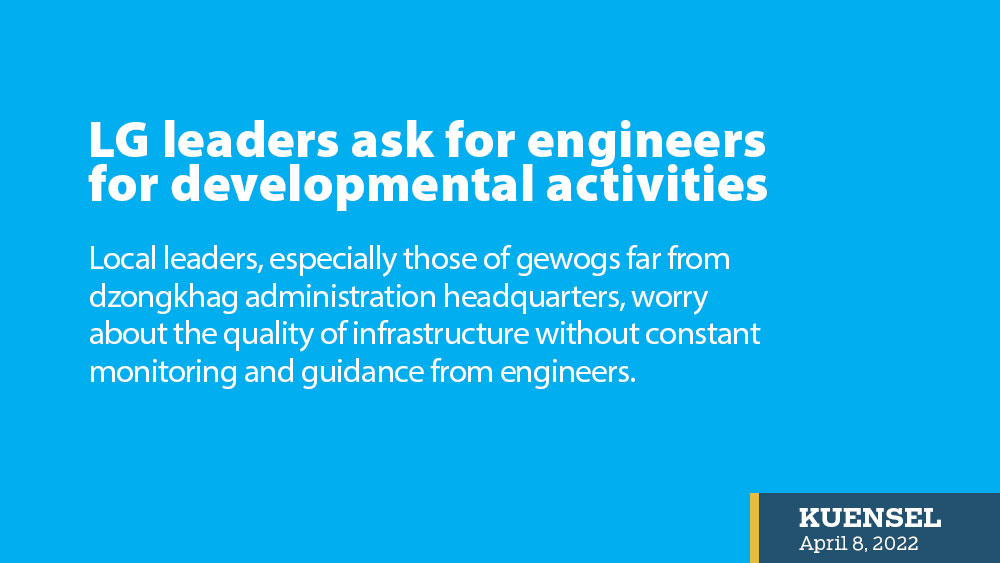Phub Dem
Local leaders, especially those of gewogs far from dzongkhag administration headquarters, worry about the quality of infrastructure without constant monitoring and guidance from engineers.
The gewogs were allotted engineers each. However, the local leaders say they work from the dzongkhag headquarters and could not visit the construction sites regularly, often impeding the quality of work.
The gups question the effectiveness of decentralisation and significant budget allocation to the local government without such experts.
According to section 265 of the Local Government Amendment Act 2014, the gewog administration shall be staffed with accounts personnel and engineers. However, the gewogs had been calling the engineers from the dzongkhag for some years.
Naja Gup Chundu Tshering said that the quality issues in the gewog arise because the local leaders do not have the qualifications to check the quality, adding that it is often challenging although they monitor it regularly.
He said that the availability of engineers depended on the dzongkhag’s schedule, adding that having an engineer at the gewog centre would be of immense help, especially for gewogs that are far from the dzongkhag.
Besides, he said that the absence of engineers during the monitoring of community contract works compromised the quality and in adhering to the instructions. “It is challenging to keep track of the work without the engineer’s expertise in the locality.”
Sangbaykha Gup Tobgay said there was an engineer in the dungkhag, but different engineers from dzongkhag visited the site to monitor or hand over the project, adding that it was difficult to keep track of the work.
For instance, a drain built by a community contractor was higher than the road. Tobgay said the contractors blamed the engineer who initially approved it, but the one who came for handing-taking refused to accept the work as it was not up to the standard. “If a single person handles the same project, there won’t be any issues.”
He said that all the gups of Haa met recently to discuss the issue. They have forwarded a letter to the dzongkhag expressing the concern and need for engineers to effectively carry out developmental activities in the gewogs.
Considering the remoteness of the gewog, he said that it was challenging for the engineers as most of the communities are isolated and scattered. He said that the gups requested an engineer to work from the gewog.
“Works are usually delayed waiting for an engineer’s visit to the gewog as they are mostly engaged in dzongkhag and project works.”
Gakiling Gup Wang Tshering said that gewogs need engineers starting from the estimation, evaluation, and assessment till the completion of works. He said that every development work depends on engineers due to auditing issues later. In their absence, most works remain incomplete, and allotted budgets are not used despite the community’s critical need for the infrastructure.
He added that gewogs received numerous projects, but implementation suffered without the experts.
Gewogs near the dzongkhag headquarter also face similar issues.
Bji Gup Passang said that the restructuring plan of pooling engineers in the dzongkhag was as per the Royal Civil Service Commission’s aim to maintain a small, compact, and efficient civil service. However, he said that gewogs had to face the brunt of the decision as gewogs are handicapped without them.
He said it was challenging to carry out work on time as they are burdened with centre and gewog’s work. “I have been waiting for the engineer’s schedule to visit the site for bridge construction for a month. The officials are busy and burdened with work too.”
It was learnt that the re-organisation plan is expected to enable knowledge sharing, specialisation of engineers, and improved work quality as engineers with different expertise and qualification would be stationed together.


